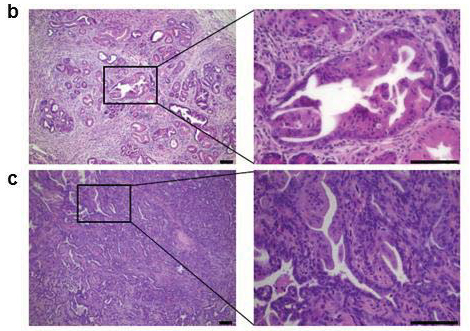Gene against pancreatic cancer discovered

In a study published in Nature today (Sunday 29 April), researchers have identified a potential new therapeutic target for pancreatic cancer.
The team found that when a gene involved in protein degradation is switched-off through chemical tags on the DNA’s surface, pancreatic cancer cells are protected from the bodies’ natural cell death processes, become more aggressive, and can rapidly spread.
Pancreatic cancer kills around 8,000 people every year in the UK and, although survival rates are gradually improving, fewer than 1 in 5 patients survive for a year or more following their diagnosis.
“The genetics of pancreatic cancer has already been studied in some detail, so we were surprised to find that this gene hadn’t been picked up before. We suspected that the fault wasn’t in the genetic code at all, but in the chemical tags on the surface of the DNA that switch genes on and off, and by running more lab tests we were able to confirm this.”
Co-lead author Professor David Tuveson from Cancer Research UK’s Cambridge Research Institute
The team expects this gene, USP9X, could be faulty in up to 15 per cent of pancreatic cancers, raising the prospect that existing drugs, which strip away these chemical tags, could be an effective way of treating some pancreatic cancers.
“Drugs which strip away these tags are already showing promise in lung cancer and this study suggests they could also be effective in treating up to 15 per cent of pancreatic cancers.”
Professor David Tuveson Cancer Research UK’s Cambridge Research Institute
The researchers used a mouse model of pancreatic cancer to screen for genes that speed up pancreatic cancer growth using a technique called ‘Sleeping Beauty transposon mutagenesis’. This system uses mobile genetic elements that hop around the cell’s DNA from one location to the next. Cells that acquire mutations in genes that contribute to cancer development will grow out and ‘driver’ cancer genes may be identified.
By introducing the Sleeping Beauty transposon into mice pre-disposed to develop pancreatic cancer, the researchers were able to screen for a class of genes called a tumour suppressor that, under normal circumstances, would protect against cancer. These genes are a bit like the cell’s ‘brakes’, so when they become faulty there is little to stop the cell from multiplying out of control.
This approach uncovered many genes already linked to pancreatic cancer. But unexpectedly, USP9X was identified.
“The human genome sequence has delivered many promising new leads and transformed our understanding of cancer. Without it, we would have only a small, shattered glimpse into the causes of this disease. This study strengthens our emerging understanding that we must also look into the biology of cells to identify all the genes that play a role in cancer.”
Co-lead author Dr David Adams from the Wellcome Trust Sanger Institute
More information
Funding
This research was supported by the University of Cambridge and Cancer Research UK, The Li Ka Shing Foundation and Hutchison Whampoa Limited, the NIHR Cambridge Biomedical Research Centre, and the NIH.
Participating Centres
A list of participating centres can be found in the paper.
Publications:
Selected websites
The Wellcome Trust Sanger Institute
The Wellcome Trust Sanger Institute is one of the world’s leading genome centres. Through its ability to conduct research at scale, it is able to engage in bold and long-term exploratory projects that are designed to influence and empower medical science globally. Institute research findings, generated through its own research programmes and through its leading role in international consortia, are being used to develop new diagnostics and treatments for human disease.
The Wellcome Trust
The Wellcome Trust is a global charitable foundation dedicated to achieving extraordinary improvements in human and animal health. We support the brightest minds in biomedical research and the medical humanities. Our breadth of support includes public engagement, education and the application of research to improve health. We are independent of both political and commercial interests.


